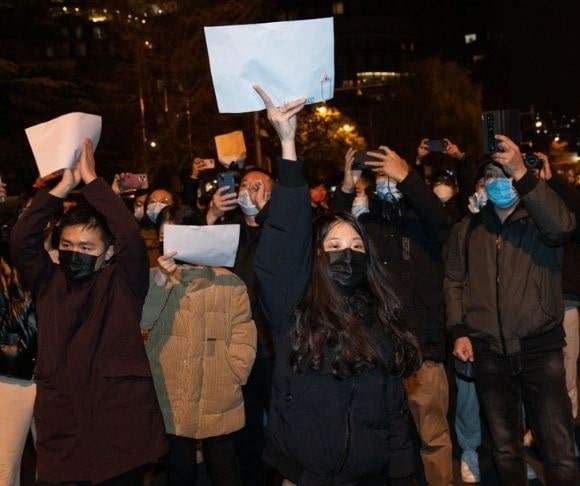It’s rare to see the Chinese Communist Party care, much less bend to the people’s will, but after a month-long eruption of highly publicized protests and calls for President Xi Jinping to step aside, the government raised a white flag. Having been the origin of COVID-19, China adopted incredibly restrictive policies, locking citizens in their own homes and requiring daily testing to move about more freely. But it appears now that the government will open the country and stop mandatory testing and whole-community quarantines. So, is this a knee-jerk reaction to an angry mob, or is there a different reason Xi Jinping had a change of heart?
 It’s not about the desires of the commoners; rather, it’s about the bottom line: exports are down, factory production is stalled, the housing market is stale, and the economy is heading in the wrong direction.
It’s not about the desires of the commoners; rather, it’s about the bottom line: exports are down, factory production is stalled, the housing market is stale, and the economy is heading in the wrong direction.
China Protests Create Opportunity
Not quite as dramatic as the “let them eat cake” line uttered by Marie Antoinette, but the CCP is slyly giving the people what they want. And then they can blame them later when hospitals are at capacity and restrictions begin in earnest after the economy is back on an even keel. And it appears that the financial markets are also wary of the latest allowances of freedoms. Zero-COVID policies put a kink in the supply chain. More recently, Apple Inc. grew concerned that the country might not be able to continue the honor of being the company’s biggest iPhone assembly plant.
It’s not all China’s fault: it’s a global economic turndown and soaring inflation in the wealthiest nations that affects every country’s bottom line. There is simply less discretionary income everywhere. The other issue is that China was the leading supplier of pandemic-related items such as masks and gloves, which has gone back to typical pre-COVID demands.
Li Bin, the deputy director of China’s National Health Commission, still insists the easing of COVID controls was due to the “strong reaction” of folks taking to the streets and demanding freedom. And he also states that the latest strains of the virus are less deadly. But Dali Yang, a professor of political science at the University of Chicago, believes loosening the reins to help jumpstart the economy is the real reason for revising the zero-COVID doctrine.
And now Yang says the country needs to brace for the inevitable massive spread of the virus.
China’s Balancing Act

(Photo by Stringer/Anadolu Agency via Getty Images)
The plan now is to ensure the elderly have access to vaccinations. Those entering areas of the vulnerable population — nursing homes, daycare centers, and schools — would still have to submit to daily testing. Ben Cowling, an epidemiologist at the University of Hong Kong, surmises that the laid-back revisions would soon give way to severe restrictions once more:
“An uncontrolled epidemic (one which only peaks when the virus starts running out of people to infect) … will pose serious challenges to the health care system, not only in terms of managing the small fraction of Covid cases that are severe but also in the collateral damage to people with other health conditions who have delayed care as a consequence. And I wouldn’t rule out the possibility that stricter measures are reintroduced to combat rising cases.”
The rebounding of a once robust economy will not happen overnight. And for now, the people of China are feeling a bit of relative freedom. But give it time and Xi Jinping will have yet another reason to instill in his people the debatable assertion that western-style relaxation of pandemic policies will only end with an increased human death toll.




